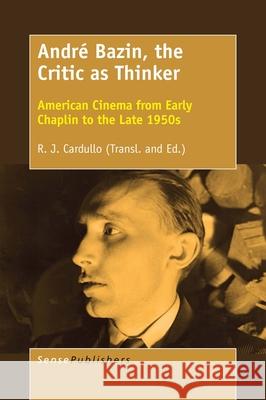André Bazin, the Critic as Thinker » książka
André Bazin, the Critic as Thinker
ISBN-13: 9789463008778 / Angielski / Twarda / 2017 / 358 str.
André Bazin, the Critic as Thinker
ISBN-13: 9789463008778 / Angielski / Twarda / 2017 / 358 str.
(netto: 420,89 VAT: 5%)
Najniższa cena z 30 dni: 425,63
ok. 22 dni roboczych.
Darmowa dostawa!
AndrE Bazin (1918-58) is credited with almost single-handedly establishing the study of film as an accepted intellectual pursuit, as well as with being the spiritual father of the French New Wave. Among those who came under his tutelage were four who would go on to become the most renowned directors of the postwar French cinema: FranCois Truffaut, Jean-Luc Godard, Jacques Rivette, and Claude Chabrol. Bazin can also be considered the principal instigator of the equally influential auteur theory: the idea that, since film is an art form, the director of a movie must be perceived as the chief creator of its unique cinematic style. AndrE Bazin, the Critic as Thinker: American Cinema from Early Chaplin to the Late 1950s contains, for the first time in English in one volume, much if not all of Bazin's writings on American cinema: on directors such as Orson Welles, Charles Chaplin, Preston Sturges, Alfred Hitchcock, Howard Hawks, John Huston, Nicholas Ray, Erich von Stroheim, and Elia Kazan; and on films such as High Noon, Citizen Kane, Rear Window, Limelight, Scarface, Niagara, The Red Badge of Courage, Greed, and Sullivan's Travels. AndrE Bazin, the Critic as Thinker: American Cinema from Early Chaplin to the Late 1950s also features a sizable scholarly apparatus, including a contextual introduction to Bazin's life and work, a complete bibliography of Bazin's writings on American cinema, and credits of the films discussed. This volume thus represents a major contribution to the still growing academic discipline of cinema studies, as well as a testament to the continuing influence of one of the world's pre-eminent critical thinkers.
André Bazin (1918–58) is credited with almost single-handedly establishing the study of film as an accepted intellectual pursuit, as well as with being the spiritual father of the French New Wave. Among those who came under his tutelage were four who would go on to become the most renowned directors of the postwar French cinema: François Truffaut, Jean-Luc Godard, Jacques Rivette, and Claude Chabrol. Bazin can also be considered the principal instigator of the equally influential auteur theory: the idea that, since film is an art form, the director of a movie must be perceived as the chief creator of its unique cinematic style.André Bazin, the Critic as Thinker: American Cinema from Early Chaplin to the Late 1950s contains, for the first time in English in one volume, much if not all of Bazin’s writings on American cinema: on directors such as Orson Welles, Charles Chaplin, Preston Sturges, Alfred Hitchcock, Howard Hawks, John Huston, Nicholas Ray, Erich von Stroheim, and Elia Kazan; and on films such as High Noon, Citizen Kane, Rear Window, Limelight, Scarface, Niagara, The Red Badge of Courage, Greed, and Sullivan’s Travels.André Bazin, the Critic as Thinker: American Cinema from Early Chaplin to the Late 1950s also features a sizable scholarly apparatus, including a contextual introduction to Bazin’s life and work, a complete bibliography of Bazin’s writings on American cinema, and credits of the films discussed. This volume thus represents a major contribution to the still growing academic discipline of cinema studies, as well as a testament to the continuing influence of one of the world’s pre-eminent critical thinkers.











